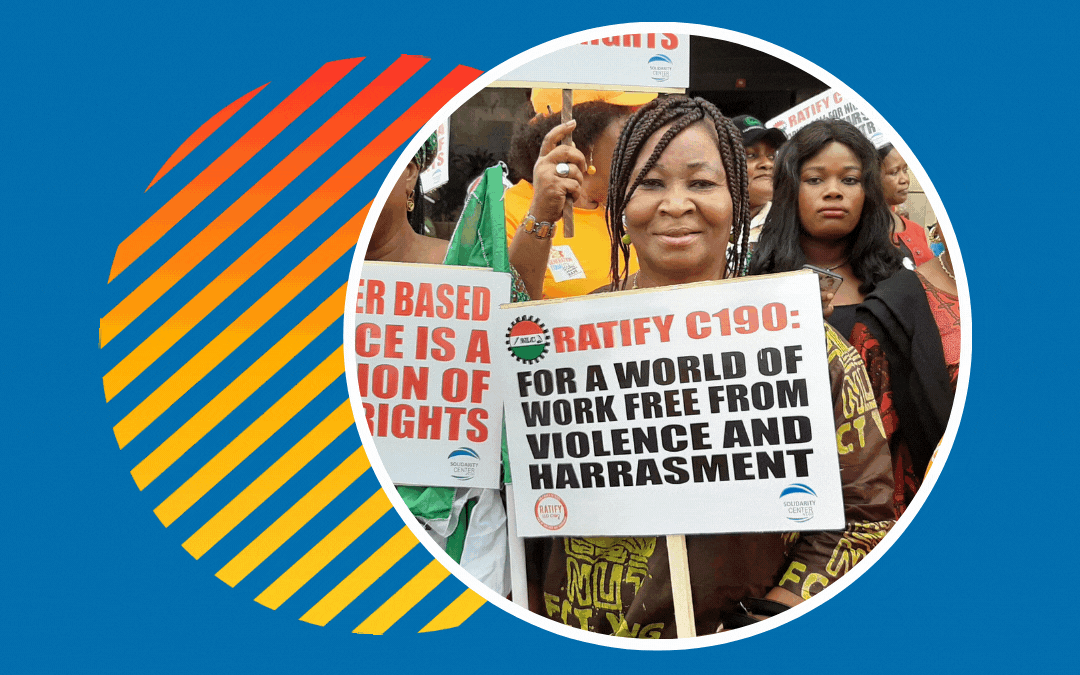
Nov 17, 2021
Union women are not waiting for their governments to ratify Convention 190, the international treaty that addresses gender-based violence and harassment in the world of work—they are taking action now to ensure workers benefit from the powerful rights it provides, according to Rita Goyit, speaking on this week’s Solidarity Center Podcast.
“We are taking concrete measures while we wait for the ratification,” says Goyit, head of the Nigeria Labor Congress (NLC) Department of Women and Youth and secretary of the NLC’s National Women Commission.
With support of the NLC and Solidarity Center, union activists conducted an informal survey of more than 900 women workers in Abuja and Lagos and found 57 percent had experienced GBVH at work, yet 20 percent did not report it for fear of employer retaliation.
“What was common about the story is that sexual harassment, gender-based violence exists in the workplace,” Goyit tells Solidarity Center Executive Director and podcast host Shawna Bader-Blau. “And it was not treated as a workplace issue.”
Through outreach and training, Nigerian unions are reaching workplaces as diverse as garment factory floors and sprawling informal markets, where workers put in place what works for them, like anonymous suggestion boxes to report harassment.
Goyit says union women are developing strategies that “will really address gender-based violence in the workplace because this is a worker-specific issue, it’s coming from with the workers ourselves.
“We’re putting our heads together until we find the solution … because the women are with us. Because I feel strong when I see the other women around me in our campaigns, in the negotiations that we do.”
More from The Solidarity Center Podcast!
Listen to this and all Solidarity Center episodes here or at Spotify, Amazon, Stitcher, Castbox or wherever you subscribe to your favorite podcasts.
Download recent Season Two episodes:
The Solidarity Center Podcast, “Billions of Us, One Just Future,” highlights conversations with workers (and other smart people) worldwide shaping the workplace for the better.
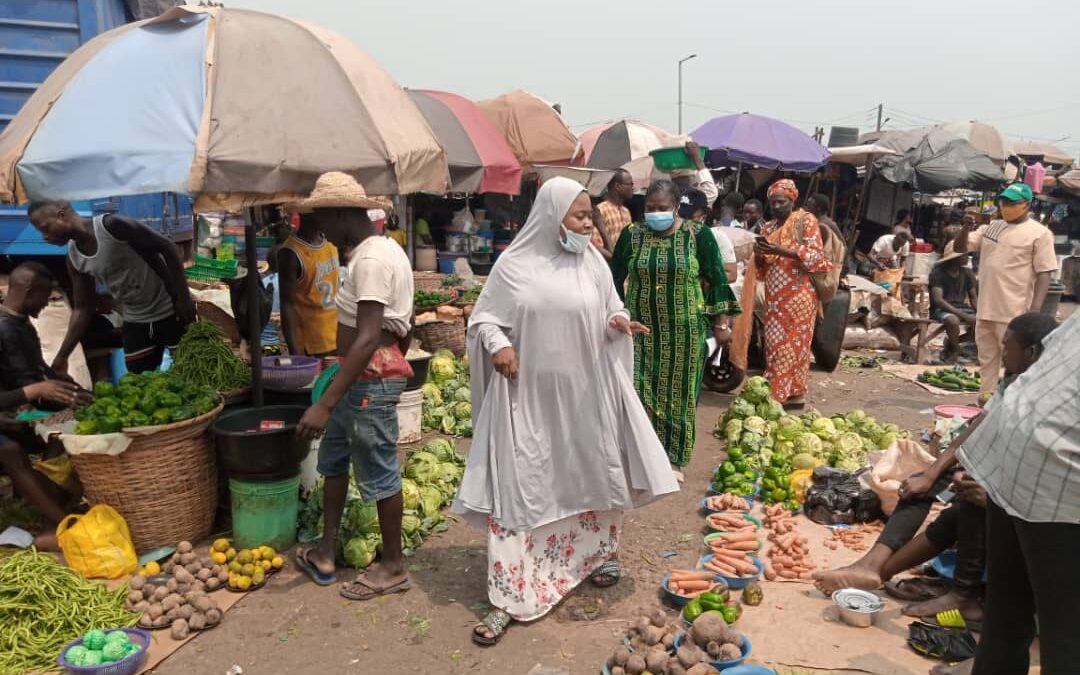
Nov 1, 2021
A magistrate court in Nigeria this week recommended prosecution of a man accused of sexually assaulting a minor in a bustling Lagos open marketplace—and gender rights activists there say the move was the direct result of awareness training conducted with market vendors about their right to violence-free workplaces. Nasiru Umaru, 44, is now in KiriKiri correctional center. The girl was helping her mother make extra money by selling goods, as do many children forced to work in hazardous environments to ensure their families make enough to meet basic needs.
Bringing a case like this is rare in the market, says Onyeisi Chiemeke, an attorney with International Lawyers Assisting Workers network (ILAW), which is aiding with the prosecution. Chiemeke says a newly formed gender-based violence task force in the market brought attention to the alleged rape, and the case now goes to trial in Nigeria’s high court. ILAW, a project established in 2018 by the Solidarity Center, is the largest global network of workers’ rights lawyers and advocates.
Building Synergies to Fight Violence and Harassment
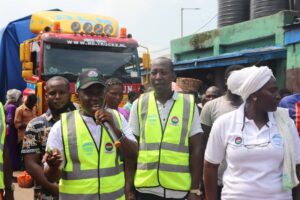
Amina Awal, Hausa language GBVH educator trainer, reaches out to workers in the Mile 12 Lagos market truck park. Credit: Solidarity Center / Nkechi Odinukwe
Following the 2019 adoption of Convention 190 at the International Labor Organization (ILO), union leaders at the Nigeria Labor Congress (NLC), together with the Solidarity Center, began training workers, seeking to put into practice C190’s extensive provisions on preventing and ending gender-based violence and harassment (GBVH) in the world of work.
“I think we are making a lot of progress, a lot of awareness,” says Rita Goyit, head of the NLC’s Department of Women and Youth and secretary of the NLC National Women Commission.
Mile 12 market vendors who took part in the training quickly formed a GBVH task force that worked with the NLC to develop a market code of conduct covering gender-based violence and harassment. The vendors also posted suggestion boxes for reporting GBVH, and the NLC’s Lagos State union chapter leader monitors the submissions and alerts the NLC when necessary.
Vendors also are creating posters to spread awareness and talking with other sellers at the vast, sprawling market, where thousands of people visit each day to buy vegetables, legumes and other food items.

NLC and market leaders at the Mile 12 market in Lagos partnered to raise awareness about gender-based violence and harassment at work. Courtesy: NLC
Key to the success of the trainings, says Goyit, is that they were held in local languages. “That was one of the strategies that really worked—it was a language they understood. People talked one-on-one in the local language.” Vendors from across Nigeria travel to Mile 12, the largest in Lagos, to sell their wares.
The NLC also is joining with unions and allied organizations in urging the government ratify C190. Ratifying an ILO convention signifies a country’s intention to be bound by its terms. Union activists worldwide are campaigning for its ratification, and nine countries have done so.
As the accused man awaits a court hearing, Chiemeke says the synergy between market vendors and lawyers is helping make concrete the rights that Convention 190 provides to violence-free environments.
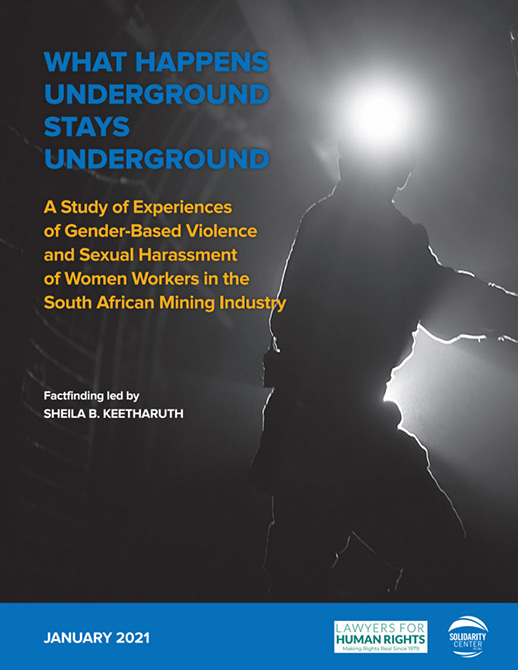
Apr 28, 2021
Women working in South Africa’s mining sector report being subject to sexual and gender-based violence and harassment, inside mines and within the mining communities where they live and efforts to redress such abuse must address the nature of the workplace and political, social and economic factors.
Download here.
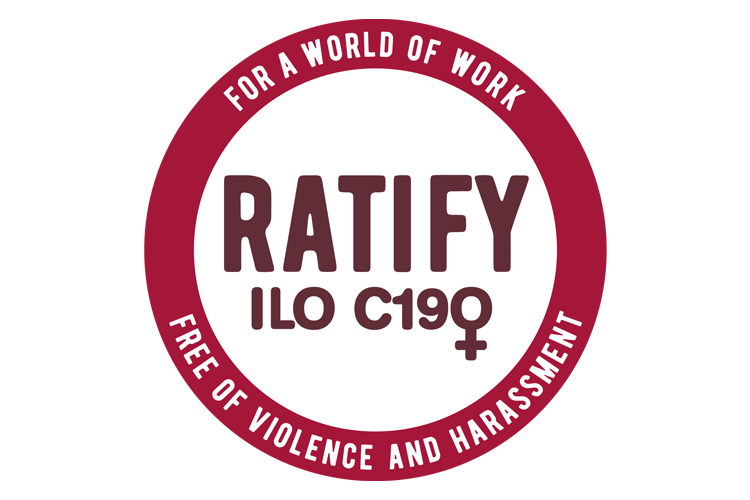
Apr 5, 2021
Union women and Solidarity Center partners from the Middle East and North Africa spearheaded a petition calling for governments to ratify International Labor Organization Convention 190, the landmark global labor standard adopted in June 2019 to eliminate violence and harassment in the world of work, including gender-based violence and harassment (GBVH).
“The idea of starting a petition arose during the seminar we held as a collective, ‘Women for the Dignity and Rights of Women’ [where] women from different Arab countries presented their efforts to get their countries to ratify Convention 190,” says Touriya Lahrech, president of the Morocco Contributions Forum, a Solidarity Center partner.
Unions and civil society organizations launched the petition in conjunction with the United Nations Commission on the Status of Women meetings and the Generation Equality Forum in March. Activists from Bahrain, Egypt, Iraq, Jordan, Kuwait, Lebanon, Morocco, Tunisia and Yemen who comprise the Coalition for Women’s Rights and Dignity coordinated with the International Trade Union Confederation (ITUC) to host the online petition.
The petition is available in Arabic, English, French and Spanish.
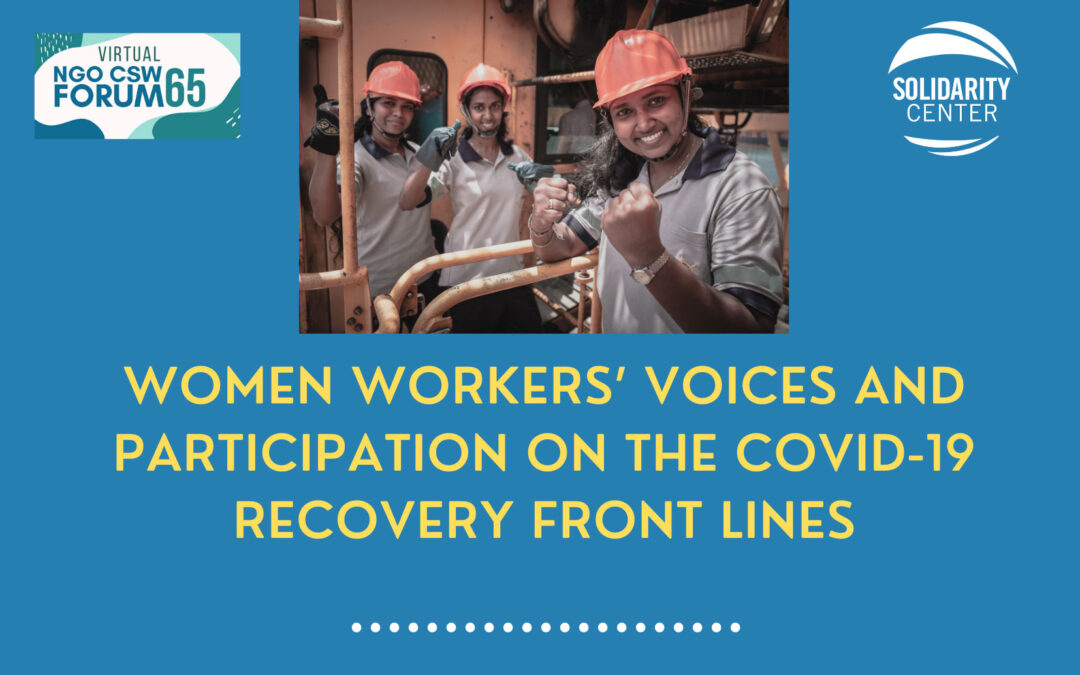
Mar 17, 2021
The COVID-19 pandemic has hit workers hard—but women have especially suffered compared with men, experiencing higher rates of unemployment, discrimination and exposure to the virus, and skyrocketing rates of gender-based violence and harassment (GBVH), speakers said this week at a Solidarity Center panel. Unions are organizing to demand that government responses to the pandemic’s economic and social effects center on the needs and experiences of women workers, ensuring safety and respect for all workers.

“Women have suffered because most of the work they do is precarious”—Rose Omamo, Kenya
“Women have suffered because most of the work they do is precarious—they are informal workers, frontline workers,” said Rose Omamo, general secretary of the Amalgamated Union of Kenya Metalworkers. Omamo explained how COVID-19 has shown the need to extend social protections like paid sick leave and health care to all workers, and to address issues affecting women in Kenya and worldwide. She shared that rape and sexual assault in the world of work has increased because of economic stress caused by the pandemic, including an increase in domestic violence and increased demands for sexual favors in order to obtain or keep a job. Kenyan unions are organizing to demand that social protections include access to reproductive health services in light of increased sexual violence, and are bargaining with employers to increase protections against GBVH in the workplace.
Omamo was among five women union leaders and Solidarity Center partners who took part in “Women Workers’ Voices and Participation on the COVID-19 Recovery Front Lines,” a virtual parallel event during the United Nations Commission on the Status of Women (CSW) as part of the NGO CSW65 Virtual Forum.
Employers, Government Failing Women Workers in the Pandemic

Employers have used COVID-19 as an excuse to violate worker rights, says Cambodian union leader Ou Tepphallin.
Employers have taken advantage of the pandemic to exploit, abuse and lay off workers, panelists said. “Labor rights have been violated during COVID-19 as employers used the opportunity to exploit the system,” said Ou Tepphallin, president of the Cambodian Food and Service Workers Federation.
Retail, hospitality and garment workers in Cambodia, the majority of whom are women, have not been provided adequate personal protective equipment (PPE) or measures to ensure their safety, and unscrupulous employers have taken advantage of the crisis to exploit and abuse workers. For example, workers in the hospitality sector report that entertainment venues have opened illegally during lockdown and forced workers to return to work. Some companies deliberately targeted older or less conventionally attractive workers for layoffs. Unions have been organizing to hold employers to account, negotiating for better protection measures, including protections from GBVH.

When women are in unions, they can speak out against mistreatment and come together to create solutions, says Honduran union leader Iris Munguia.
In Honduras, the impact of the pandemic collided with ecological and social crises. The devastation caused by two hurricanes in November 2020 left many women homeless and struggling to support their families, said Iris Munguía, women’s coordinator of the Honduran Federation of Agro-industrial Unions (FESTAGRO). In addition, women experience extremely high rates of GBVH, which is treated with impunity in Honduras. More than 30 women have been murdered in 2021, and “there are no investigations of these murders,” Munguia said.
The combined crises have left women workers more vulnerable than ever to exploitation and abuse. The majority of workers laid off during the pandemic were women, and unions have been organizing to ensure women workers are at the bargaining table to win protections from employers, including access to childcare, adequate protective equipment and protections against GBVH at work. Unions in the agricultural sector are demanding that multinational companies do more to ensure greater safety on the job. Munguia discussed the power of union organizing, stressing that women in trade unions had the ability to speak out against mistreatment and come together to create solutions.
In Honduras, Munguía is part of a campaign for C190 ratification, while also training women to be part of negotiations with employers so they can advocate for contract clauses that benefit them, such as childcare and a violence-free workplace.
“We have a great advantage by being unionized,” she said. “Whenever we face discrimination, harassment, we can report it, denounce it, talk about it—and that opportunity is there because we are part of a union.”
‘We Have a Great Advantage: We Are in a Union’
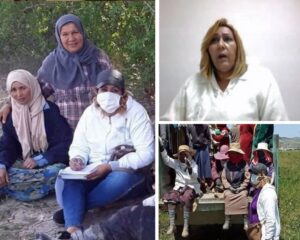
UGTT’s Nadia Bergaoui shared images of women agricultural workers as she discussed the challenges they face at work.
In the face of such challenges, women have stepped up their efforts to achieve justice at the workplace, according to the panelists, including efforts to push their governments to ratify Convention 190. Adopted by the International Labor Organization in 2019, the convention seeks to end violence and harassment in the world of work, including gender-based violence.
Across Tunisia, where 500,000 women work in the informal agricultural sector, the Federation of Agriculture and the Tunisian General Labor Union (UGTT) are working to end gender-based violence through awareness-raising programs that ensure women know their rights on the job and can speak out for safe conditions, especially on the dangerous transport to and from work, said Nadia Bergaoui.
Bergaoui, general secretary, media officer and women’s affairs officer of the Federation of Agriculture, said a union survey in 2020 found that more than half of women said they have faced verbal or physical abuse on the job, and lack access to paid time off, sick leave or health care. The union is organizing workers to demand safe transportation, protections against GBVH, PPE and access to social protections.
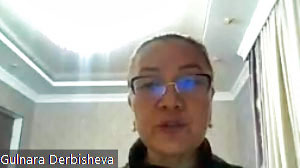
Unions in Kyrgyzstan are advocating for protections for women workers, says Gulnara Derbisheva.
Gulnara Derbisheva, director of Insan Leilek, discussed how unions in Kyrgyzstan are advocating for protections for women workers, including demanding that the government address the increase in GBVH during the pandemic by ratifying Convention 190. Unions, with Solidarity Center support, opened a women migrant worker center in Bishkek, where workers have reported increases in GBVH and other abuse on the job. She shared how she is working with unions to advocate for greater protections for women migrant workers, including ratification of C190.
“Unless we keep advocating, we will be in a standstill,” she said.
Watch a recording of the event, simultaneously translated for Arabic, English, Khmer, Russian and Spanish speakers.












